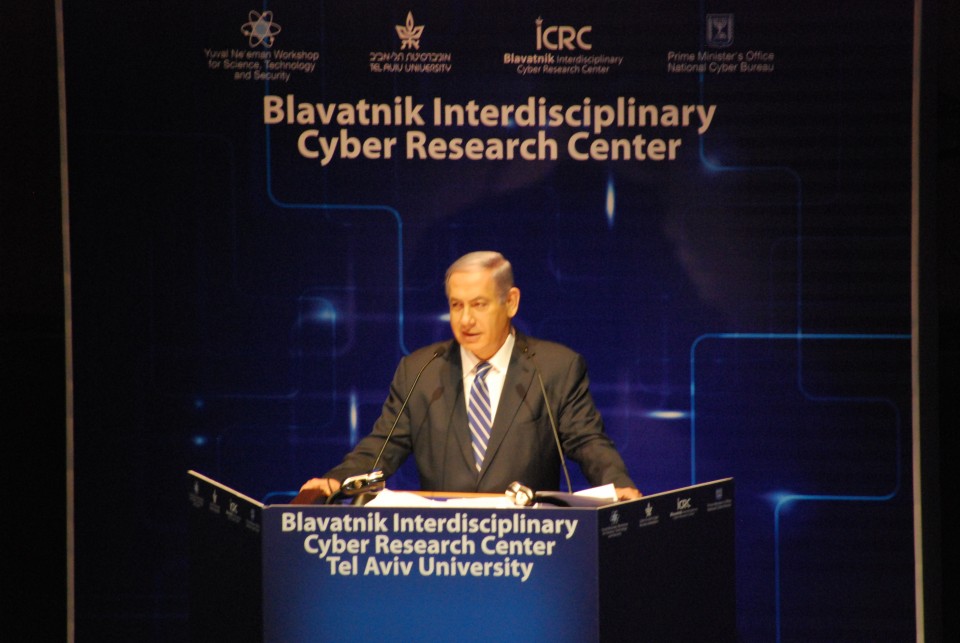Address by Prime Minister Benjamin Netanyahu at the 5th International Cyber Conference 23.6.15
 The whole point of your being here today, here in Tel Aviv University under the invitation of Professor Joseph Klafter and Major General Yitzhak Ben-Israel, my friend, and Ambassador Dan Shapiro and Ambassador Gould from Great Britain, I think you're all here because you know that we do question things. The whole point about cyber is you've got to question and challenge all the time. This is a rapidly-evolving discipline or lack of discipline. It's the fastest growing, fastest changing domain in the international economy and international security in our world.
The whole point of your being here today, here in Tel Aviv University under the invitation of Professor Joseph Klafter and Major General Yitzhak Ben-Israel, my friend, and Ambassador Dan Shapiro and Ambassador Gould from Great Britain, I think you're all here because you know that we do question things. The whole point about cyber is you've got to question and challenge all the time. This is a rapidly-evolving discipline or lack of discipline. It's the fastest growing, fastest changing domain in the international economy and international security in our world.
The greatest force of change and growth is the internet-driven economy, with all its derivatives. It is changing by the hour, and we have to be constantly ahead of the curve. I've set a goal a few years ago to ensure that Israel is one of the leaders of cybersecurity. My job as Prime Minister is to make sure that it stays that way. We are living in a new normal of data generation. Each year, more data is accumulated and created than in the world's entire history. We're in the throes of a great change. We're moving from atoms to bits, from place to space. I don’t want to say that we're walking in the clouds, but we sort of are. And it requires that we be at the cusp, at the edge of innovation all the time.
The cyber needs and the cyber market is not a staid, low growth market where you can establish a position of dominance as we have and rest on your laurels. This is the classic high-growth, super high-growth markets in which you have to constantly innovate to maintain your position. We've done that now. We said we'd be among the top three. We are. But we have to make sure that we're there ten years from now, twenty years from now, fifty years from now, because it's not going away. And therefore we have established two major arms to deal with this, two government resolutions that we accepted, that we passed a few weeks ago. One is to create the National Cybersecurity Authority, in order to build market resilience, in order to define how we approach the question of defense. I'll say more about that in a minute. And the second is the decision to create the IDF cyber forces. And we are eager to build capacities that endure and develop in order to have the cutting-edge needs that we need for national defense.
Let me say something about defense and cyber. The most difficult question is where you draw the fence. Do you draw it around a company? Do you draw it around an airbase or a power plant? And the answer is yes and no. Yes because you need it in every one of these installations, facilities or services. No because it's not enough. But how far do you go? Where do you draw the fence? And if somebody punctures that fence, what do you do about it? Who do you tell? How do you prepare in advance? Who do you share this information with? What do you do about it?
These are exceedingly complex questions and there are no obvious answers. And so in the face of this uncertainty, you can basically do two things. You can do something and just say: It's too complicated, I don’t know what the solution is. It's fast-evolving, or you can say: We'll organize ourselves by making decisions and moving forward. We have a saying in the military: We organize ourselves in movement. God, that's a terrible translation. I'll say it in Hebrew - מסתדרים תוך כדי תנועה. That means you move, you decide where you're going and you sort of get the forces, the vehicles, moving alongside as you decide a direction. We've decided on these two directions, I think they're monumental decisions. We may be ahead of most countries, we may be ahead of all countries, but we're moving, and we can see the change that is developing once we've decided what we're doing.
We learn as we go along. We can share with governments, with companies, with entrepreneurs what we're doing, well, some of what we're doing. I think that's important. And Israel is a unique place. It's unique because it has first of all a relatively large number of people who excel in this area, but I think it's not merely a question of numbers although I'll have something to say about that in a minute. It is a unique place because of the culture that we have that is absolutely necessary here and that is to challenge assumptions, challenge assumptions. This is something that is deeply embedded in the DNA of our people. The father of our nation, Abraham, challenged God. That's as big a challenge as you can have. And we have had that embedded in our culture throughout and it's very much something that we see in the development of businesses.
I think that we have another advantage, which is perpetual investment in this field. And our task is to take this perpetual investment and make it into not only a vehicle for national defense but also a vehicle for business. Now, I think there are many factors that have contributed to our concept of how to advance it, how to advance business here, but one of them was borne of an experience that I had studying in Cambridge Massachusetts a hundred years ago. I lived on the campus in a place called Kendall Square and I used to go down to the Sloan School where I went to school and right across the street was this warehouse, ugly, very different from the other buildings that you had there, I.M. Pei towers and modern facilities, and here there's this, right across the street where I live, this warehouse, opaque windows, bars, and I said: What is this? And I was told: Well, this is some kind of government labs, CIA, no, NSA – first time I heard those words, those letters – and of course what that was the implantation of government investments in the middle of a campus that eventually produced Route 128 and Route 495, a Silicon Valley, replicated pretty much the same way in Stanford, in the San Francisco area with that other Silicon Valley.
And I thought: That's a pretty good combination. You have government investment of military and security intelligence and academia that produces spawns, business start-ups, and that's essentially what we decided to do in Be'er Sheva. We've decided to take our NSA and our other associated units, put them in the Negev and smack, in Be'er Sheva, right next to the university, to have our National Cyber Headquarters, Ben-Gurion University, and a cyber-park, which is rapidly expanding with some of the world's leading firms.
This is a prescription of getting the forces that can build the future in one place, in a small place where that culture that I spoke about can grow and thrive. And we encourage our young people who come out of the military to enter into these fields. It's not merely that they encourage themselves. We encourage it, and we'll be giving tax breaks in a few months to companies that go to Be'er Sheva in order to further enhance this ongoing investment because every year we take our brightest young men and women and we put them through our military and security system and encourage them to become entrepreneurs.
And so Israeli start-ups have been bought at the rate of about a billion dollars in the last eighteen months. We've had hundreds of millions of dollars of investment in the last year alone in Israeli start-ups, and more is coming. And our job is to make sure that this machine, this perpetual motion machine continues to move and at a rapid pace, and we're committed to it, and everything that we do. We view this as the future, we view this not just as an auxiliary part of our economic effort. We view it as a major, major thrust of our economic effort, a growth engine for the next fifty years.
A few days ago I had a visit in my office by Eric Schmidt, you’ve heard of him? Small company. He said to me: Israel is the digital powerhouse of the world. I said: Eric, you don’t think you're exaggerating? He said: Well, let me be precise. In absolute size, you're number two, after the Western Silicon Valley, but you're ahead of New York, you're ahead of Cambridge MAS, you're ahead of Cambridge England, he said. I don’t want to offend anyone. Dan Shapiro, the Ambassador of the US, this is an American citizen saying, and Matthew, that's what he said.
I'm just saying that there is tremendous growth. He said that he's investing in Israel, that he's done wonderfully well with a lot of these start-ups, he said: This is where the future is built because, he said, of this particular culture. Culture is very difficult to replicate. It's not clear how you repeat something like this, but it's happened here and our job is to make sure that it keeps on growing, so we're going to invest a lot in making sure that we have an abundant supply of young people, I mean kids who study math at the highest level. We have special programs for cyber education, both in our schools and in the military. We're absolutely, absolutely committed to this domain because we want to make sure that we're dominant.
I said that it's not going to go away because the problem of protecting the internet-driven products, services, is so vast, it's so challenging that it's just going to get more and more complicated. We have certainly hackers that attack, we have non-governmental organizations that attack. But the greatest threat comes from governments, and like-minded governments that want to protect the privacy of their citizens, their bank accounts, their infrastructure, their economies, have to work as far as they can together to cooperate against this new threat.
Specifically, Iran has been launching attacks against us, against Saudi Arabia, against the United States, against many others, and we're determined to enable ourselves to protect ourselves from these attacks and others. And the way we're doing it is this combination of government, military, academia and business. We think this is a potent opportunity.
My point to you is that we are moving ahead and we're committed to stay ahead. And I think each of you can have your own opportunity here. I think Israel is exciting, it's open, it's open for your business. I'm glad you're here in the 5th International Cyber Conference. The numbers grow each year, the investments grow each year, the opportunities grow each year, and I'm here to basically tell you if you're not in Israel, you should be; if you are, do more.
And one more word. If you haven’t met Eviatar Matanya, who is our National Cyber Director, you should know this guy. He's been doing a fabulous job and he'll keep on doing it in the years to come.
Thank you very much, thank you all.


